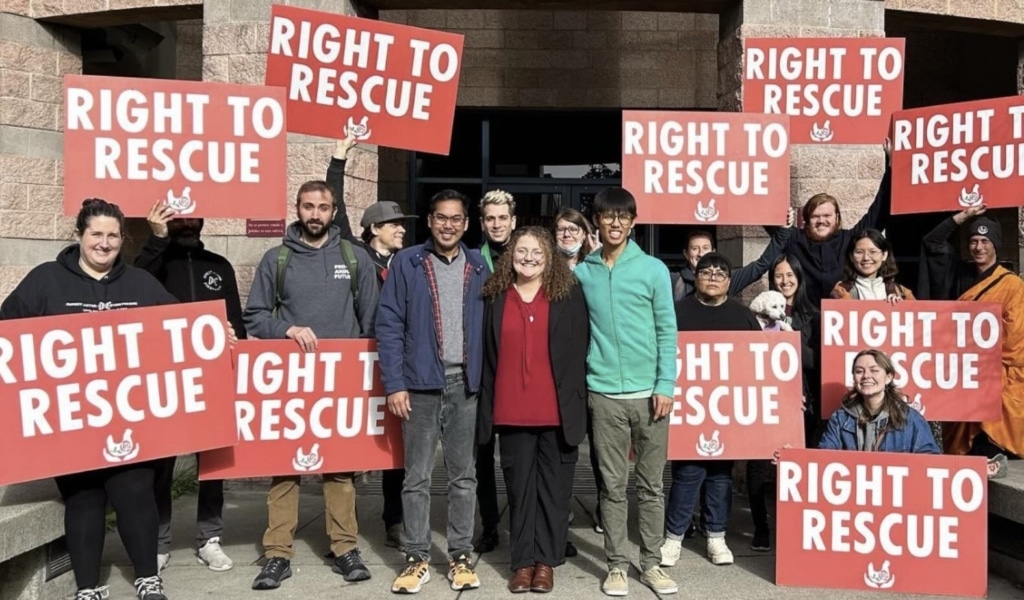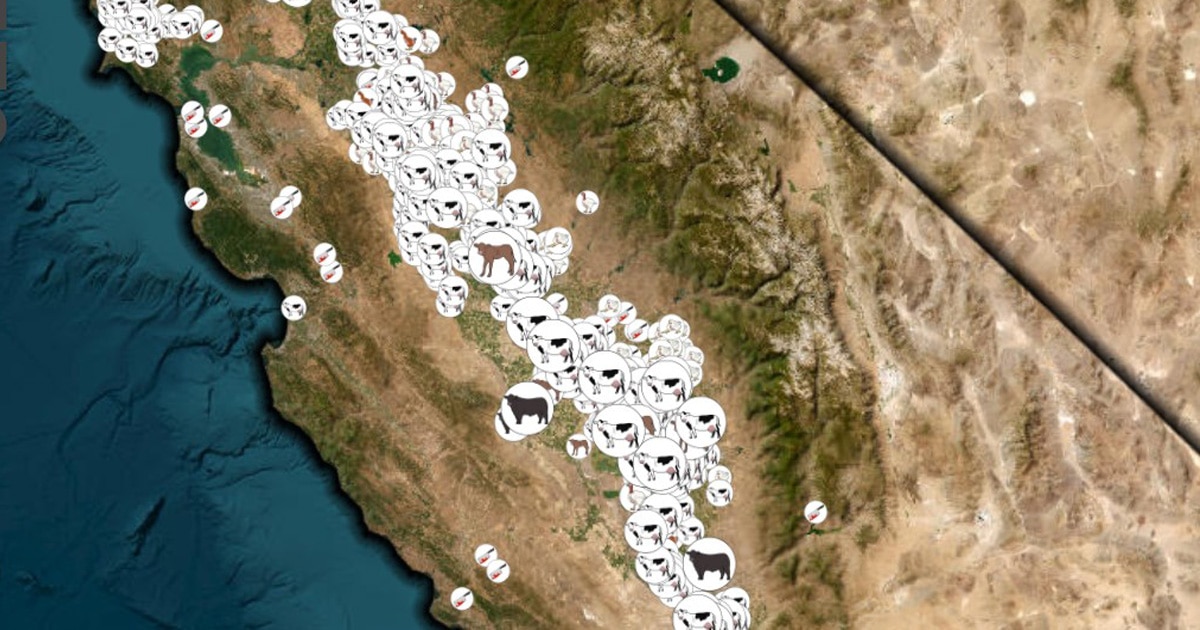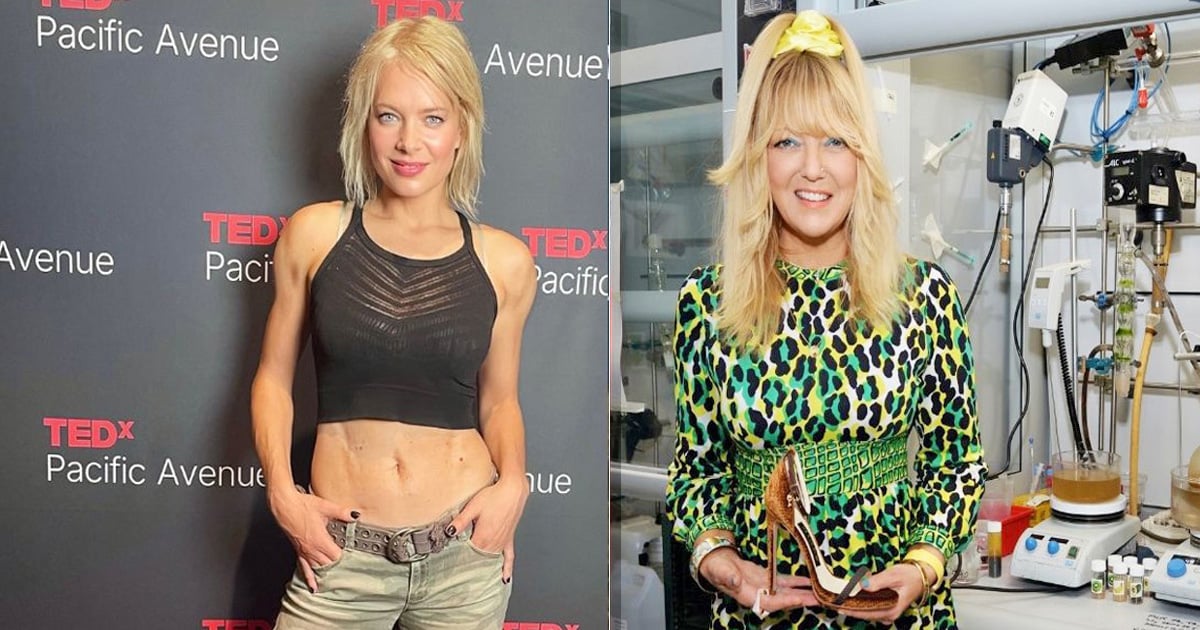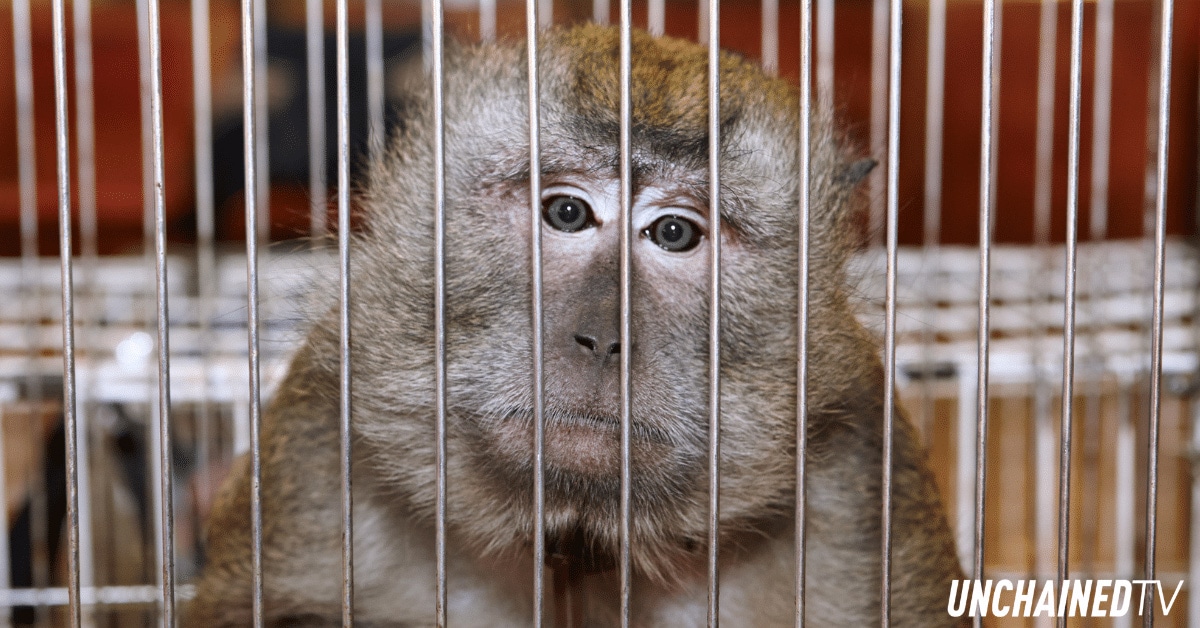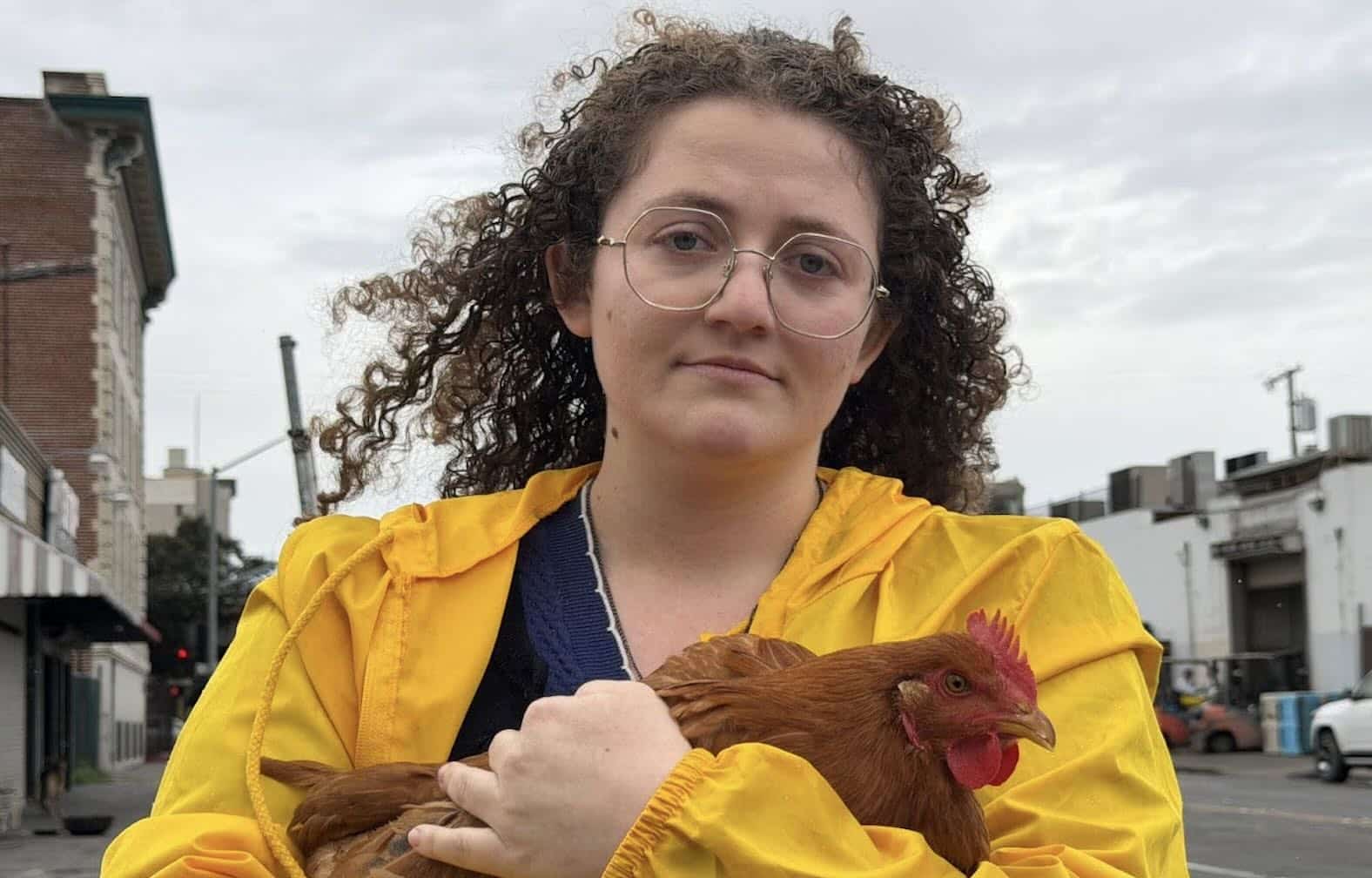Who Will Stop the Fireworks Threat to Animals and Kids?
The fireworks threat is growing in California, endangering people, companion animals, and wildlife while safe alternatives like drone shows wait to replace them.
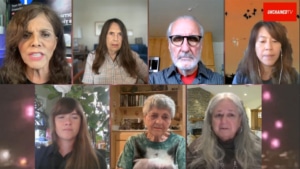
Participants in UnchainedTV’s Emergency Town Hall to End Fireworks
Los Angeles, September 12th, 2025 — Communities across California are demanding urgent action to confront the fireworks threat. A growing number of citizens in America’s most populous state are urging a cultural transition to safe, modern alternatives. Fireworks cause tragic accidents and deaths and unleash waves of trauma for animals, veterans, and families.
In California alone, ten people were killed by fireworks in and around the recent July 4th holiday, including an eight-year-old girl hit by a misfiring fireworks display and 7 people who died when a fireworks warehouse exploded. The danger is undeniable: toxic pollution, terrified wildlife, lost and injured companion animals, and human casualties. And, fireworks also sparked many dozens of small fires in California, a state still reeling from the massive Pacific Palisades, Malibu and Altadena fires in January of 2025.
Click Here To Join the Movement to End Fireworks
It’s time to replace this medieval practice with modern celebrations like drone and light shows. UnchainedTV’s Jane Velez-Mitchell organized an Emergency Town Hall to push for this change, featuring Anna Christensen and Ann Cantrell, both Co-Chairs of the Sierra Club Los Cerritos Wetlands Taskforce, Marcia Hanscom of Defend Ballona Wetlands, biologist Roy Van de Hoek, as well as attorneys Natalie Marcin, Christina Ku and Susanne Cumming. You can watch the Town Hall here:
Fireworks’ Impact on Wildlife
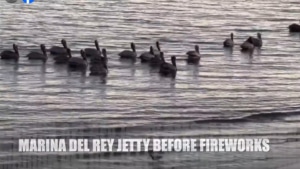
Pelicans in Marina del Rey before fireworks
The devastation of wildlife was at the heart of the town hall. Biologist Roy Van de Hoek explained how pelicans, unable to see well at night, collided and disoriented themselves when forced into flight due to a massive July 4th fireworks display centered precisely at their Marina del Rey habitat. Hundreds of pelicans vanished overnight, leaving questions about their long-term survival. Such scenes echo across wetlands and coastal habitats, where fireworks disrupt delicate ecosystems already under immense strain.
Marcia Hanscom of Defend Ballona Wetlands recalled the first time she saw dolphins exposed to fireworks in Malibu. “I knew that dolphins are very sensitive to sound… those loud blasts obviously would impact them,” she warned. Fireworks near sensitive reserves amplify the harm, with explosions reverberating across habitats meant to protect threatened species. Protected reserves should be sanctuaries, not battlefields where endangered animals are forced to flee. The cumulative effects — missed nesting cycles, abandoned offspring, and disrupted migrations — leave deep ecological and biological scars.
Alternatives exist and are thriving globally. “Drone shows… don’t leave the toxic chemicals. They don’t scare the wildlife,” Hanscom emphasized. These vibrant aerial displays, already gaining popularity in Europe and parts of the United States, promise spectacle without destruction. With music, storytelling, and dazzling visuals, they prove celebration doesn’t require devastation.
The War on Wildlife
The fireworks debacle at the Marina del Rey jetty is devastating to pelicans and many other species. These massive fireworks displays occur at the mouth of the Ballona Wetlands Ecological Reserve, home to 1,700 species, including threatened and endangered species. There is currently an ongoing legal battle to stop a phony “restoration” project at those wetlands, a greenwashing plan that would actually wipe out all that wildlife by bulldozing the entire square mile over the course of about a decade with plans to excavate more than 2-million cubic yards of soil using heavy machinery, hundreds of workers and more than 800 vehicle trips per day. Hanscom’s Defend Ballona Wetlands organization won a court victory when a judge invalidated the misguided plan’s Environmental Impact Report. But, the battle is not over.
Watch “Help Stop the Bulldozing of LA’s Wildlife at Ballona Wetlands!”
Pollution, Companion Animals, and Human Trauma

Scared puppy on ottoman, by Michael Pettigrew via Adobe Stock Images
When it comes to fireworks, the harm doesn’t end with wildlife — humans and their animal companions also face devastating consequences. Anna Christensen noted, “On the day of fireworks and after fireworks, we have the worst air quality. It just is off the charts.” The toxic mix of metals, soot, and ash rains down into waterways, contaminating ecosystems and threatening human health. Families inhaling the fallout breathe the same toxins that poison fish and birds. Such pollution disproportionately affects communities near beaches and waterways, where explosions are often staged.
For companion animals, fireworks season is a nightmare. Dogs and cats bolt in panic, many never to be found. In fact, more companion animals go missing on July 4th than any other day of the year. Resident Karen LaCava described her ordeal: “It is so loud. My whole house vibrates when the fireworks go off… My dogs are so frightened. I have to give them something to mellow them out.” Animal shelters brace annually for waves of lost and injured companion animals, burdening resources and leaving families heartbroken.
The toll on people extends further. Veterans of war and survivors of violence relive trauma with every explosion. Despite claims that fireworks honor veterans, the U.S. Veterans Administration itself warns that fireworks can trigger flashbacks and panic.
Watch “Foster Crisis from July 4th Fireworks”
The Legal and Political Fight Ahead

Crowd watching fireworks, by NDABCREATIVITY via Adobe Stock Images
As families and animals suffer, legal battles reveal why fireworks persist despite overwhelming evidence of harm. Attorney Natalie Marcin, of Coast Law Group, highlighted lawsuits that forced SeaWorld and regional fireworks shows to obtain Clean Water Act permits. Yet enforcement remains weak, with monitoring often left to consultants paid by fireworks promoters. “There isn’t very much honesty in consulting science,” biologist Van de Hoek cautioned, calling for independent oversight.
Still, entrenched politics and profit-driven interests stand in the way. California Coastal Commission hearings reveal how powerful lobbying protects fireworks, even against staff recommendations favoring drone shows. Ann Cantrell recounted how Sierra Club members held blankets under trees to catch baby birds blasted from nests during Long Beach’s “Big Bang on the Bay.” The commission still allowed the show to continue, bowing to local influence.
With public support mounting, momentum is building. Advocates argue that true cost-benefit analysis — including healthcare, environmental damage, and animal rescue — shows drones are not only safer but often cheaper long-term. “Drone shows would, if not be cheaper, they would be as comparable to what fireworks show cost,” Cantrell explained. With lives lost, ecosystems shattered, and companion animals traumatized, communities are rallying behind alternatives.
If you want to help, you can sign this petition titled “Lights & Music-NOT Fireworks on LA coast! Protect Pets, Wildlife & Veterans – Save Lives!” Any companies or agencies connected to this issue are invited on any time to comment.
Watch Actor James Cromwell Vow to Stop LA’s Ballona Wetlands Bulldozing!
It’s just a nightmare.
[Speaker 1]
Welcome to this emergency town hall to stop fireworks. They are medieval, literally. They began in the 11th century or even earlier.
They are deadly and destructive. 10 people, 10 human beings were killed as a result of fireworks in and around the July 4th, 2025 holiday in California alone. We have a team of experts who are really, really knowledgeable about this issue who have joined us today to discuss.
But I’m going to start with something personal. I’m going to start with a heartbreaking experience that I had that literally tore my heart out in Marina del Rey. And it involves all the wildlife that I personally saw with my own eyes, devastated by the July 4th fireworks at the Marina del Rey jetty.
One of the most beautiful parts of Marina del Rey is the jetty and the wildlife near the Bayona wetlands filled prior to the fireworks, the July 4th fireworks filled with pelicans. Absolutely extraordinary and beautiful. But.
These poor animals had no idea what was coming on July 4th, everything changed for them. Look what is missing today after the fireworks, birds, no birds anywhere to be seen because of those fireworks. Where did they go?
How badly were they traumatized? We must stop fireworks. I want to go to Roy Vanderhoek, who’s a biologist who has also studied wildlife in that area.
It brings me tears, honestly, because I had to walk every day with my dogs past that very area. No pelicans for well over a month. They’re coming back, but very slowly, certainly not at the number that were there.
Roy, tell us about the impact of the fireworks on July 4th to the animals living in that area of Marina del Rey, which is right at the mouth of the Bayona wetlands ecological reserve, home to one thousand seven hundred species, including threatened and endangered species.
[Speaker 2]
Yes, well, the California brown pelican, as your photography showed, is and it’s near dusk at sunset. You know, when we do the July 4th fireworks and this is a diurnal bird, it doesn’t fly at night. So by this time in the day, it’s trying to roost and sleep and they are social.
So they congregate. It’s the end of the nesting season. They’ve returned to the mainland from the Channel Islands where they breed.
I see several of the pelicans had white heads. Those were adults and there were some with brown heads, which are juvenile first year birds. And so when that firework starts, they don’t want to they don’t want to be flying because, as I just said, they’re a diurnal bird.
They are resting and being wary. And for the next day to. So this is disturbing them.
They go into flight. They don’t even see that well. And when they’re tightly together in a group like that and they have six foot plus wingspans and it’s very laborious to take off into the air, they were certainly their wings were touching each other, hitting each other.
They were disoriented. They said this is not a safe place. And that’s why they didn’t come back the next day.
There may have been some mortality. We don’t know. But we do know that their behavior was greatly impacted.
And that’s what we should be thinking about, like what happens to them in the next weeks and months. And are they going to come back? And the mouth of the Iona River and the Marina del Rey jetties is calm water.
It’s shallow. It’s warm. There’s a lot of fish there.
It’s a nursery. So they want to be here because it’s a place to get a lot of food. And we have several federal reports that have indicated that 10,000 to 12,000 brown pelican will be on the breakwater island at the jetty.
And the fireworks were done at ground zero just within, oh, I’d say 50 yards to 75 yards of where those brown pelicans that you photographed. Yeah, it’s a big impact.
[Speaker 1]
Marcia Hanscom, you have also been very active in this battle. This is just what I’ve taken off my phone. Watching from Encino, the entire valley go up in explosions, looks like a war.
I can only imagine the wildlife all across the valley being very badly impacted. Can you describe what is at stake here for our wildlife? Yes, well, the wildlife, I never even thought of that, frankly, even though I had been doing work to protect wetlands and endangered species for some time.
I had loved fireworks since I was a child, so I didn’t think there was anything wrong until Roy, the biologist here, took me to a fireworks show in Malibu. And he said, oh, my God, they’re putting those fireworks off right where the dolphins swim. And I knew that dolphins are very sensitive to sound, that they require their senses.
It’s called echolocation. In order to move, in order to find food, everything they do is supported by this echolocation. And those loud blasts obviously would impact them.
In fact, the U.S. Navy has been under very serious litigation related to this because of the blasts that they put off trying to deal with military defense in the water. And so this is a problem. We don’t even know the degree of problem we have related to the wildlife that are impacted here.
And what’s what’s horrible at Marina del Rey is that these fireworks are shot off right above the only state ecological reserve in all of L.A. County, the Bayona Wetlands Ecological Reserve. And so besides the wildlife that are in the marina jetty, the entire ecological reserve is impacted. I want to show one shot of one pelican in a box landing near a doorstep as a result of these fireworks.
Now, magnify that by a hundred. This is what we’re dealing with. And, you know, what’s so frustrating about this is that there are alternatives and the alternative is pretty darn wonderful.
It’s called a drone show, and they’re growing in popularity around the world, particularly in Europe. But also there have been many drone shows here in the United States. They’re exciting.
Like I said, fireworks have been around since medieval times. How many times you have to see the same thing? Look at how fantastic this is.
These are just a couple of examples of what drone shows can do. They don’t leave the toxic chemicals. They don’t scare the wildlife.
They can have music accompanying them, but it’s certainly not going to have the impact of something that sounds like a war zone. So I want to bring in, there’s two ladies who have joined us today that are leading the fight to try to switch to this civilized 21st century solution. And let’s start with Anna Christensen.
Anna, you’ve done some incredible work trying to wake people up to this beautiful alternative and get the California Coastal Commission, which makes these decisions, and other bodies that are authoritative to take this leap and do it in a way that will help us avoid the catastrophes while people are still having a lot of fun and celebrating and good family fun, as everybody says they want to have. Anna.
Yeah, thanks a lot for having us and for elevating this topic. It comes to people’s minds, of course, around the 4th of July or New Year’s. But other than that, you know, it’s just another day.
We do want to point out that on the day of fireworks and after fireworks, we have the worst air quality. It just is off the charts. And of course, breathing is something that we all do.
I would point out the issue of the Miner’s Canary, where we are concerned about wildlife, but we are not separate from wildlife. Our relatives, we’re all in that same position. So when we think that it doesn’t matter what happens to a bird or a companion animal, it’s really not true.
We all have to breathe air. And fireworks are incredibly toxic to air and water. So there’s a lot of long term health consequences.
We got involved when we were trying to protect nesting coastal birds, especially great blue herons in our local marina. And this led us to, because trees were being removed where they nested. Well, we were successful in that.
We have not been able to stop a small local firework show, which is part of the city’s policy. It’s incredible to me that when we talk about freedom, I noticed one of your headlines was what is freedom? And the freedom of a restaurant business or a cruise boat owner in our downtown harbor to apply for a permit and get a permit that is so destructive to human health and animal health and the environment.
And we can’t seem to do this as an individual right. And it has a lot to do with income. And the city gets income from special events.
So we’re really up against a structure that’s very much a capitalist, profit making structure. And I think that what we need to educate people to do is that your individual fun or your entertainment at the expense of the freedom to breathe, whether it’s animals or people, is not acceptable. That’s not freedom.
That’s aggression. And that’s what we’re looking at, an aggressive policy that is very, very destructive. And of course, we also in our town don’t acknowledge our rookeries or the need to protect coastal wildlife to the degree that that we should be.
You know, we go up to the mountains or we go to a special place to see wildlife and we breathe mountain air. But you know what? Mountain air is just actual air that that it’s air that hasn’t been really harmed and polluted by human activity.
And we’ve been with Coast Law. I’m so glad to see Coast Law here today because they really sued over this particular fireworks show and they tried their best. They’re working down in San Diego.
She can go more on it. But it really is an uphill battle. And yet when we took our petition to the local farmers market asking people to oppose the fireworks show, we only had one guy who even barely supported it.
I don’t really believe that the general public is all that committed to being able to, you know, harm themselves and others as a way to way to party. And I’ll stop there for now because there’s a lot of. Of course.
And I want to correct this poor little baby is a great blue heron. Well, so traumatized. I couldn’t tell from the photo look to be like a pelican.
But this is a great blue heron in the box. But it actually makes my point. It wasn’t just the pelicans.
I pointed out the pelicans. It’s the egrets. It’s the cormorants.
It’s the great blue herons and also the sea lions, the the the seals. They vanished as well. And that’s why, you know, I started reaching out and saying, what can we do?
Because I was devastated. I don’t want to live in a dead zone. It’s not all about condos and cars.
To me, what makes Marina del Rey priceless is the wildlife. I don’t want to live here if it’s a dead zone. And that’s what these fireworks are doing, in my humble opinion.
I want to bring in you mentioned the law group, Natalie Marcin. I hope I’m pronouncing your name correctly. You’ve had some sick.
[Speaker 3]
I’m sorry. You were frozen on my screen for the past 10 seconds. What was the question?
[Speaker 1]
How have you been successful? What what is your experience stopping fireworks?
[Speaker 3]
Sure. Well, Coastal Law Group represents Coastal Environmental Rights Foundation, which has been advocating against fireworks for over a decade, maybe close to two, and they’ve been instrumental in getting the first ever ever Clean Water Act permit, the general permit in the San Diego region for fireworks. So now there’s finally some clean water best management practices that are put on the shows, whether they’re following those best management practices is hard to tell.
And that’s where our current advocacy is against SeaWorld, where we are alleging that they are not following their best manager practices as required by the Clean Water Act. And we also in the Alamitos Bay got the first ever general fireworks permit up there as well. So similarly, they will now have to follow best management practices in line with the Clean Water Act.
We’ve also been pushing policy and advocacy for the Coastal Commission, as you mentioned. And last year, they indicated that they were not going to continue to support fireworks shows. We’ll see if that holds true in the upcoming months and years.
But that’s where we’re at now. And we are looking and advocating for the solution to be drone shows, as you mentioned.
[Speaker 1]
Well, let’s talk a little bit about the California Coastal Commission. Recently, they approved fireworks for Capitola, California, despite the fact that I testified, Marcia testified, I believe several people who are on this emergency town hall, Roy Vanderhoek testified against it. So let’s listen to a little of the debate back and forth, and then we’re going to talk about it on the other side.
[Speaker 6]
I’m the Public Works Director for the City of Capitola. Thank you so much for considering the city’s annual permit for its fireworks show. This longstanding event provides free family entertainment and supports local fundraising for educational and recreational activities in the county of Santa Cruz.
Monitoring reports from previous year’s events have not identified any significant adverse impacts. As the agency responsible for protecting Capitola’s coastal environment, the city is pleased to take on the permanent responsibilities to ensure continued compliance. We’ve coordinated this project with your staff ecologist and agree with all mitigation measures included in the permit, and we support staff recommendation and proposed conditions and are available to answer any questions.
[Speaker 1]
Respectfully, you falsely suggest that there’s no ramifications from these fireworks. Fireworks cause death and bloodshed. In California alone, 10 people died.
There was a tragic blast, you may have seen it, at a warehouse, a fireworks warehouse. Seven people died this holiday. An eight-year-old girl was killed by fireworks.
In Simi Valley, a man died and his house caught fire. A man was also killed in Pacoima. Okay, 10 people died.
You know, where were those fireworks headed in that deadly explosion that killed seven people? Were they headed to Capitola? You can’t just exempt yourself from this destructive industry.
It is killing people. It is causing wildlife to fall out of trees. It is giving veterans PTSD and triggering them.
It’s causing more lost pets than any other time of year. It must end. Why are you backing something medieval and deadly?
Think about the parents of that eight-year-old girl. Is that family-friendly fun? When you have a safe and effective and entertaining alternative in drone shows, I urge you to please join the 21st century.
There is no excuse for this violence. It is violence. I want to reiterate, there is a feasibly environmentally superior alternative, a drone show that does not blast and disturb wildlife with no chemicals that harm the wildlife.
I saw in your staff report no analysis of the chemicals.
[Speaker 6]
You’re gonna have somebody go out the next day and pick up some of the cardboard and plastic debris that falls from the sky after these fireworks, but you’re not able to get the heavy metals, copper, strontium, barium, and other chemicals create the colors of these fireworks.
[Speaker 1]
Fireworks also emit fine particulate matter and soot and ash. All of that goes into the water. I know because I watched this at Marina Del Rey.
So Christina Koo, you’re an attorney, lives near Marina Del Rey. You’ve been very involved in the battle to save the Bayona wetlands from bulldozing, they’re calling it a restoration, but bulldozing LA’s last coastal wetlands, home to 1,700 species is not restoration. Here we are fighting to save these animals while these bombs go off.
Essentially, that’s how animals perceive it, as bombs going off. What’s your reaction to how the Coastal Commission, I know you’ve testified many times as we all have, what’s your reaction to how the Coastal Commission is handling this situation, Christina?
[Speaker 4]
So yes, it’s a huge issue that does involve the Coastal Commission. And one interesting thing that I found was that there are nonprofit groups, for example, the Coastal Environmental Rights Foundation. They have been working with California Coastal Commission and they will, on behalf of different groups, nonprofits, talk to them and meet with them.
And they have been very successful. And so I have spoken to a few who work at this nonprofit and they are very interested and continue to talk with activists and experts and being the liaison with the Coastal Commission for the Marina del Rey fireworks issues. And some of the topics that we’ve discussed were, because it’s a special situation where the Marina del Rey fireworks are right next to the Bayona wetlands, an ecological reserve, that that really should be an exception to the situation and really should have some forces behind it to stop or decrease or ban such fireworks that obviously will violate some of the air and water quality acts.
And so this might be a really good angle to continue to work with this nonprofit to approach the commission.
[Speaker 1]
Well, I know you do a lot of work in that regard. I wanna say this whole idea that there are these hearings where people testify and they go, yes, we’re monitoring and we see no adverse effects. I was there on July 5th at the Marina del Rey jetty.
There were no scientists running around looking to see whether the pelicans and the egrets and the cormorants were still there. I mean, there was not a single bird anywhere in sight where the day before there had been hundreds. So they say that they monitor, but honestly, the way they’re monitoring, it’s kind of like whatever outcome they want is what they get.
And I would like, Ann Cantrell, you’ve been waiting very patiently. You’ve been fighting this in Long Beach. What are your thoughts about how the system, I dare say, is kind of rigged to have the outcome that the powers that be want?
You put the words right out of my mouth. We thought we had a win this last year when the Big Bang on the Bay fireworks show applied for a permit from the Coastal Commission last June. Because for the first time, the Coastal Commission staff agreed with us.
[Speaker 7]
And they even went so far as to contact a drone company and determined that there were places in Alameda Bay where drone shows could be done instead of fireworks. And the staff recommended to the commission that they give a permit for the show only if the drones were used, not fireworks.
[Speaker 1]
So we were ecstatic when we went to the hearing, thinking we at last had a win. And lo and behold, the commissioner from Long Beach, Robert Uranga, it was his last day on the commission. He was turned down.
He’s had a stroke, and unfortunately has a lot of trouble speaking. And he got the pity of the commission to give this permit for the show, which he has been one of the people that has been, I’m blanking out on the word. He has backed the show for years.
And so as a final gesture, the commission voted unanimously to have the Big Bang one more year. They did say that this would be the last year. I’m hoping that this is going to be the fact because Anna and I and other Sierra Club members have been down there for four years in a row during the fireworks, holding blankets under the trees, hoping to catch any falling babies that are blasted out of their nests.
And we have never caught a baby, but we found dead ones the next day every year. Either they fall out of the nest at the time, or they starve because their parents don’t return. This is just incredible that we have to keep putting up with this when there are alternatives.
And I would like everybody who’s upset about this, thank you so much, Ann, to sign this petition, bit.ly forward slash stop fireworks. Just copy that down and sign it, because we’re going to take this emergency town hall and those petitions and go to the powers that be and say, you know what, all this nonsense about everybody supports fireworks and family fun, everybody I know in this neighborhood where I live can’t stand fireworks. We all commiserate the day after.
Our dogs have to be sedated. More dogs are lost than at any other day of the year on July 4th, only because of the fireworks. And then there’s people say, well, you know, it’s legal fireworks are fine, but the illegal ones are bad.
The legal fireworks inspire the illegal fireworks. If there were no fireworks around here, I don’t think people would be trudging over here to set off their fireworks. They know there’s legal fireworks and they piggyback off of it and set off the illegal fireworks.
So they’re all interconnected. And I want to play a little bit of an interview I did with a woman who has two dogs, Karen LaCava, who says her life is really, really devastated by fireworks every year.
[Speaker 5]
It is so loud. My whole house vibrates when the fireworks go off. I feel like my house is going to fall down.
[Speaker 6]
And then the next day and that night, there’s debris all over the place.
[Speaker 5]
I have to always water down my roof and my lawn before July 4th, before January 1st, because I’m so afraid that they are going to set my place on fire. It’s horrible. And I can’t, for days afterwards, actually for months afterwards, I don’t hear breaks.
We hear breaks every day. Not only that, but the air pollution is so horrible. It’s so horrible that night and the next day.
It’s a nightmare. My dogs are so frightened. I have to give them something to mellow them out.
I put vests on them. I have started actually taking them away from the area. And then if I’m not there, I’m so nervous that I’m going to come home to a burned down house.
[Speaker 6]
I want to stay there and I can’t because I can’t leave my dogs there. They are so traumatized by these fireworks and my neighbor’s dogs are too. It’s just a nightmare.
If it, drone shows are so much better.
[Speaker 1]
We do not need fireworks. So there she is basically expressing the viewpoint that I hear from everybody. I’ll say two points.
One is that that’s not the way it’s portrayed at the California Coastal Commission and all these other venues where the decisions are made. It’s portrayed as everybody wants it. Well, where are those everybody?
Because I’ve never met them. I’ve only met people like Karen who consider this a nightmare as do I. The second thing that I want to say is that everybody’s acting like, well, either we have fireworks or we don’t have any celebration.
Okay, there’s plenty of ways to celebrate. We talked about drone shows. We talked about light shows.
For example, boat parades. There’s a million alternatives, creative alternatives then to using something that is literally medieval. I went and researched it.
This started like in the 11th century as a precursor to gunpowder and it led to gunpowder. Marcia Hanscom, can you weigh in a little bit on the politics of this? Yeah, well, I think 20 years ago when I got awakened to all of the problems and realized all this pollution, a lot of people don’t think about the pollution but what goes up must come down.
And there is a lot of pollution that comes down. There’s not just cardboard, but wires and plastic. And of course, all of the chemicals we talked about that all ends up on the land and in the water and in the air.
And I think because people have thought of this as patriotic, nobody wants to go against being patriotic. Well, of course, the 4th of July is a big celebration. The Christmas boat parade’s a big celebration.
New Year’s Eve is a big celebration. But why, we just have to start questioning out loud, why is a celebration necessary to have with it something that is actually equated with war? The whole reason we’re having the fireworks is a celebration of the 4th of July of the war, the bombs bursting midair.
That’s really what it is about. And I think there are other ways to celebrate. Last year at Marina Del Rey, the County of Los Angeles did try a possible alternative.
And during the boat parade, only during the boat parade, but they did use a light and music drone show. And the people I know who showed on their social media all these beautiful images in the sky that went along with music, they loved it. Now, not everybody could see it the same way because it didn’t have as much of a blast.
So maybe there are other ways to make it better. But unless we start trying to celebrate in other ways, I mean, why do we have 15 minutes of celebration that ends up in horror afterwards for way longer than 15 minutes? I agree with you entirely.
And Natalie, you were talking about the fact that you have seen the evidence. Tell us about that.
[Speaker 3]
Yeah, I scuba dived under the SeaWorld Fireworks Bar with a friend of mine. And we found substantial amounts of buried debris, layered on debris. So it’s a seagrass bed under the SeaWorld Fireworks Bar.
And substantial amounts of wires are kind of growing within all of the different areas of the seagrass. It had to have been what felt like years worth, what we perceive as years worth of debris. I don’t know what SeaWorld would reply to that.
I won’t put words in their mouth. And we also found fireworks foil and wrappers under there as well. And that’s an indication, at least in our opinion, that they are not following their best management practices, their fireworks permit.
[Speaker 1]
I will say this, this idea that all these scientists go out after every fireworks and they’re there looking and digging and I’m calling BS on that. Okay, I’ve lived here 35 years. I’ve never seen anybody who looks like a scientist walking around, checking to see the impact of these fireworks.
Nobody certainly did what you did, get in a scuba outfit and go down there and check it out. Anna Christensen, you’ve been very patient. What is your thought on the politics of this?
We’re about to play some Coastal Commission word salad. So before we go there, I wanna get your take on the politics of this because I say when it comes to anything, follow the money always. So I think it’s important to understand how the Coastal Commission works.
And by the way, the Coastal Commission did many years ago, was able to end a fireworks show, even though they were sued and it went all the way to the state Supreme Court. So there is precedent, but the Coastal Commission is very much like a court in the sense that they operate on a case-by-case basis. So what is brought before them, or like a planning commission, the project that is brought before them has to comply with the Coastal Act.
So it’s a project-by-project basis. And it seems a little schizophrenic right now where we have them in the case of the staff, at least, and the staff plays the role of preparing, doing the research and advocating that the commissioners take one position or another. And the commissioners don’t have to follow the staff, but they usually do.
When it comes, but to just jump a little bit sideways on this when you talk about the scientists, what scientists are we talking about? The biologists, when the Coastal Commission approved something, they approve it with conditions. Often these projects are approved with the condition that a biologist be there, or like you said, it’s somebody that is there to look underwater and stuff like that.
But who pays for this? The person who puts on the project. So the whole field of experts here are experts that take money from the promoters.
So I’m not saying that these biologists are totally unethical, but they do make a living by working for people who want these fireworks shows. And we find that their opinions are very different than ours. And their conclusions are very different than ours.
Sometimes even the Coastal Commission staff, the biologist has a different conclusion as well. But the general term is, but the birds came back. That’s what they conclude everything.
But the birds came back, but they don’t know that the birds came back. They don’t count the birds. The studies that are the most accurate have been done in the Netherlands and in Europe, where they’ve literally put tags on the birds.
And they’ve noticed how many hundreds of thousands of feet they fly away and that they do not come back. Now, there’s been some, we have real hard evidence, such as when the city shot off fireworks directly under nesting birds in a downtown park, and the birds just fell to the ground and died like this one right here. We also had a bird on video, juvenile great blue heron fall directly into the water about 30, 40 feet down in a tree and swim to a dock.
What happened to that bird? They just dismiss it. So, when you say follow the money, the people who are doing the analysis are not, they’re not necessarily coastal commission staff.
They’re not that independent. They’re literally paid for by the developers. All right, I wanna jump in and bring in, and thank you, that was brilliant.
Because what you’re saying is, if your job is dependent on finding that there’s no problem with the fireworks, what are you gonna find? There’s no problem with the fireworks. Roy, you are a biologist and you’re an independent biologist who is not ruled by a paycheck.
What are your thoughts on this whole notion that we hear in the coastal commission and other agencies all the time? Oh, well, the biologists checked or the experts checked and there’s no problem here, nothing to see here.
[Speaker 2]
Well, yes, I am an independent scientist. I’ve never been a consultant and that term consultant biologist or scientist, I’ve seen numerous instances where they write the reports and they’re listening very carefully to who’s paying them when they write their reports. There isn’t very much honesty in consulting science.
It is very, very biased. It is something that affects peer reviewed science too, which is why now scientific articles have to say who’s funding that. We do have to look at that.
And as an independent scientist, I think I’m just about maybe one of the only ones who’s ever gone after fireworks and during fireworks as a scientist to observe things. And even our famous naturalist, Charles Darwin brought in inferences from, in order to understand evolution, for example, he brought in what happens with animal husbandry and selecting, breeding an animal. So similarly, we as scientists should also be looking at in an urban area where we have all number of kinds of pets, dogs and cats, birds that people have as pets near the ground zero of the fireworks, we can collect data and indirectly relate that to what’s happening to the native animals.
And let’s remember that birds have a heightened sense of hearing and seeing. They are higher in that degree than mammals. And then, but there are some exceptions like with the bottlenose dolphin, which is a really close shore marine mammal.
It does not swim out to the outer waters. It’s very close to the surf zone. And the bottlenose dolphin on our California coast is a rare, unique subpopulation.
And we can study bottlenose dolphin related varieties in other parts of the world to gain info on what’s going on. Also, it’s a harbor and estuary and animal, and they’ve now moved to Monterey Bay. And there was no studies done at the Capitola fireworks in anticipation because there’s a bottlenose dolphin population that’s moved north to Monterey Bay now, perhaps because of climate change.
And we are woefully ignorant as a society and we’re not, we’re doing monitoring. And I think Anna Christensen has described it well. And yes, you do have to follow the money to know what’s going on.
And we have to get our information indirectly. Suzanne Cumming, who can’t be on the program today, I asked her and she followed up with checking with the International Bird Rescue Center for Los Angeles. And then they documented, they have records right after July 4th and on January 1st, where there’s numbers of birds that are brought in that are young birds or injured somehow because of the fireworks and they try to rehab them.
So we have various ways we can collect our information to tell the story scientifically on fireworks, but we’re not gonna get the answer from consultants.
[Speaker 1]
It’s common sense. I mean, you can’t do this and expect these birds to just sit there in their trees or on their little roosts where they roost, pelicans, et cetera, and just sit there and go, oh yeah, nice fireworks. Of course, it’s gonna terrorize them.
You’re not even hearing the sound. This is on silent now. It terrorizes people.
If you didn’t know that it was a firework show, it would terrorize you. It just so, the inability to just be common sense-ical about this instead of nonsensical about it. You wanna say a couple of things, Christina, please weigh in.
[Speaker 4]
Sure. So, I understand that a lot of Chamber of Commerce’s, they’re the ones that actually fund these fireworks shows, at least through the Marina area and probably everywhere else. And that’s a source of advocacy that we can somehow work with them and provide them with the alternatives and convince them to try the drone shows.
And for us to also investigate more with all the drone companies and get them on board to providing at a discount for the first year for cities that wanna try it and see how much money it brings into their cities and restaurants and entertainment and tours. So, I think it could all be more of a overall project to influence the Chamber of Commerce, to try out these new companies that bring in just as much financial benefits. And it can all go towards stopping fireworks for people to shift over.
And the other positive thing is that, I mean, the California Regional Water Board, they did give permit to the Marina Del Rey fireworks and that is up for renewal in 2028. And by that time, hopefully we can submit enough information evidence for them to seriously review this and to deny the permits. I don’t know the realities of that, but that permit doesn’t expire.
[Speaker 1]
I love what you’re saying, except when I heard 2028, no. But thank you, Christina. I think it’s very important to point out something that people don’t talk about a lot.
And that is that we are in the midst of the sixth mass extinction. We have reduced total wildlife biomass to just 4% of total mammal biomass, while increasing livestock biomass to more than 60% of total mammal biomass. At the rate we’re destroying wildlife, it’s very possible we’ll have no wildlife except in zoos within a decade.
That’s what the World Wildlife Fund is saying. That’s how quickly we’re decimating wildlife in the Amazon and development. Amazon for cattle grazing, to grow crops to feed the 80 plus billion animals we kill every year.
That’s the football fields every couple of minutes that they’re destroying. And so wildlife is already under assault. This isn’t happening in a vacuum.
This is happening in the context of the sixth mass extinction. And honestly, I think you have to just be a little bit stupid, I hate to say it, not to see that when wildlife is already under assault from development projects, like the quote unquote restoration that is a bulldozing of the entire Biona wetlands over more than nine years at a cost of hundreds of millions of dollars, that’s an assault on wildlife. Say goodbye to those wild animals.
And then you have the fireworks basically dropping bombs on them as they perceive that. I mean, what are we as a culture that we think this is okay and good family fun and then you add onto it, 10 people were killed in California alone including an eight year old girl as a result of fireworks. That’s why we’re holding an emergency town hall because this is a crisis.
This is not business as usual. I wanna go to the California Coastal Commission and I wanna applaud what one of the commissioners said. She spoke first and then another commissioner spoke and I believe she covered all bases.
Like she’s against it, but she’s for it, but it’s terrible, but let’s make it better. I don’t know, we’ll discuss it on the other side. Listen to this.
This is after all of us testified against approving the Capitola fireworks and they proceeded to approve it, but this is what they said prior to making that vote.
[Speaker 7]
But I would like to see us move away from these where we can. I think that technology of drones is bringing the price down and I’ve certainly seen more and more wow factor’s not a bad thing and they are pretty impressive, the drone shows. So I hope that, I don’t think we need to have one size fits all on the coast, but as we move towards, as the technology improves, I’d like to see more of the drone proposals.
[Speaker 5]
Our local jurisdiction in Sonoma County did realize that the cost is still quite prohibitive to transition to a drone show and so we ultimately decided to stay with our fireworks display, which was under $50,000 and to transition to drone at this time would have been over $150,000. So more than triple the cost for our local jurisdiction and also just to note that actually it was the veterans groups who were the most vocal in asking us to keep the fireworks. It was a 4th of July display and so just some interesting nuance to the conversation that I’d add and we’ve also seen some really incredible drone shows in our region in Northern California.
We’d love to see more of those and I wanted to second the comments by Commissioner Wilson and just that if we can reach out to our partners in the legislature to ask them to look at environmental concerns around fireworks, obviously the loss of lives at the fireworks storage facility in Northern California should not go unmentioned. That was a truly tragic incident, which is still under investigation, but we know that obviously the storage of fireworks as well as the environmental concerns and some of the ingredients that are used in the creation of these can certainly be improved upon. We should never just rest on our laurels, especially when lives are lost.
[Speaker 1]
Wow. I just, I had to laugh because she’s a really good politician. She covered everybody.
If you’re for them, if you’re against them, if you’re a veteran, first of all, I’d like to point out that the Veterans Administration issues warnings, okay? When fireworks don’t feel like freedom, PTSD awareness and coping during Independence Day. And it talks about all the ways, intense reactions to loud noises, feeling jumpy, emotionally detached, flashbacks that make past trauma feel immediate, feeling unable to control surroundings, resorting to alcohol or drugs to dull unwanted memories.
Oh yeah, that’s really popular amongst the veterans. I mean, you can get somebody to say anything about anybody, about anything, right? I mean, you can find somebody to endorse your position within a certain group, right?
That’s how it works. But I did want to compliment Anne Nothoff because I think, Marsha, that was a very brave comment. Even though it seemed sort of milquetoast, it was actually very brave for her to sort of buck the trend and say, you know what, maybe we gotta start looking at these drone shows.
Yeah, I think that Anne Nothoff, she used to work for the Natural Resources Defense Council. So she was an advocate for the environment for many years in Sacramento. And now she has been appointed to the Coastal Commission.
And so it’s great that she acknowledged that maybe we really shouldn’t be, we should be looking at something else. And this is a real sea change, very different than what I was hearing 20 years ago. I would barely even admit to a neighbor that I was concerned about the fireworks.
Whereas now I think more, there’s just, because we’re so connected by social media, I think there’s more and more acknowledgement that there is a concern. And I just want to say also, you brought up the mass extinction, Jane, and that’s so important. And we here in Los Angeles, in Southern California, we are in the middle of the Pacific Flyway.
There are birds that fly through here and to here that come all the way from the Arctic Circle, all the way from Chile to the South. There’s different migration pathways that they come and go on. And our wetlands, our coastal areas are essential stopping places for them.
And so when the buffalo head ducks, for instance, they come here, a couple hundred of them every year, they come from Canada, from the lakes in Canada where they’re born. And we saw them on New Year’s Eve when the fireworks went off. They were just flying around like they were out of their minds.
It was so, you could see the fear. And it was one of the biggest shocks to me to wake me up when I first saw that. And we don’t even know, because as you say, the biologists aren’t out there.
We have one naturalist, Jonathan Coffin, who is out there every year, and he has picked up and brought many, many birds to the rehab facilities that were talked about earlier. So we really do need more. We need some more science, or we just need to start telling our politician leaders that we don’t want this anymore.
Yeah, but I guess what I’m saying is that I’ve attended so many California Coastal Commission, Coastal Conservancy, and various other meetings that I realize everybody marches in lockstep. They’re all kind of, correct me if I’m wrong, okay, because you’re the experts, but my observation is they’re all appointed. Everybody kind of knows which way the wind’s blowing as far as politically, you know, smart.
And people feel like if they step out, they’re taking a risk. And yet that’s what we need these folks to do. It’s the California Coastal Commission, not the California Fireworks Commission.
I wanna do a round robin. We’re just about at the end of our hour. I hope this has been informative to people.
If you’re upset about this, as I am, just sign this petition right now, bit.ly forward slash stop fireworks. And we are going to effort, Marsha Hanscom created the, she created this petition. We’re gonna effort taking it to some movers and shakers, people who can make these decisions.
I wanna say one other thing. This idea that the latest, oh, it’s so expensive. You know what?
When you see the wild amounts of money that local and federal governments spend on very questionable projects, the idea that California, the fourth largest economy in the world, can’t get together and figure out a way to maybe achieve economies of scale by having several cities get together and saying, hey, we’ll make a deal. We’ll put it in Capitola. I’m talking about the drone shows.
We’ll put it in Capitola. We’ll put it in Long Beach. We’ll put it in Marina Del Rey.
We’ll do 4th of July. We’ll do Christmas. Let’s make a deal.
And we can lower the price using economies of scale. I don’t think the idea that these are a little bit more expensive now should be the defining issue when fireworks kill 10 people, when fireworks are traumatizing citizens who have pets, which is a huge percentage of the voters, when we’re destroying wildlife, where we’re poisoning our waters and our oceans. I wanna get Natalie, because you’re deep in the politics of this and that you’ve been to court.
Do you think something like that could be achieved, a deal? We get these companies together and say, let’s do it for up and down the state.
[Speaker 3]
I will say that the courtroom doesn’t have a lot of impact on something like that. But what I also will say is that, well, a couple of things. One, drone shows are not necessarily more expensive.
Fireworks are expensive. Getting a barge out there, having thousands of tons of explosives, all of the hazardous life cycle of the explosives, it adds up. Secondly, someplace like SeaWorld that’s doing 150 shows per year, it would actually probably be cheaper for them to buy one-time drones and be able to shoot those off continuously, right?
So each show is using the same drone and you’re not buying new fireworks every single time that you wanna launch fireworks. So over time, it would be cheaper. And in terms of economies of scale and cities getting together, I can’t comment on that, but if a city, an individual city, is using the same contractor for all of its celebrations, they could probably, on a micro economies of scale, do it that way.
There might be some issues with cities getting together and they all have their different ordinances and their different policies at play. So that’s my first thought there.
[Speaker 1]
I think what you’re saying is brilliant. What you said is you gotta buy fireworks every year. If you get the drone package, you could have those over and over again.
They do not disappear the way fireworks do, disappear in terms of just crumbling into the ocean and then poisoning our ocean. All right, I wanna get final thoughts. Why don’t we start with you, Roy, your final thoughts as we wrap up this very important hour, speaking for voiceless animals who cannot speak for themselves.
[Speaker 2]
Okay, we could say we need more animal whisperers, scientists that are experts in this. This is an animal behavior. There’s a lot of good people there.
This idea that you can just do an environmental economics, which I’ve dappled in a little bit when brought in as a scientist to that field of an economics. You can’t just do a simple cost of the fireworks versus the drone. You have to do a cost benefit analysis and look at other tangential costs that happen afterwards, like the water pollution, the air pollution, the noise pollution, doctors, people bringing their pets to veterinarians, the cost to the International Wildlife Rescue Center, other places.
If you add up all those other kinds of costs and a true genuine cost benefit analysis, I think there’s no unquestionable that drones are gonna be the big winner. And actually, yeah, just that’s really needs to be done. And we just, can I just say love nature is important.
[Speaker 1]
All right, Christina Koo, your thoughts, your final thoughts.
[Speaker 4]
Yes, I actually personally feel like the situation can make some headway with some of the business deals that can be done with these drone companies to really meet with them and look at the figures. I don’t think we’ve explored that as much yet. I’m personally curious to do that.
And we can get subsidies for some of these drone shows by wildlife experts or protectors and philanthropists to do some trials and tests at certain areas, testing out these drones. And I really think it can come down to business deals being made and bypass the courts and all the government agencies and regulations that may take years and don’t seem to have a system that is right now really advantageous to banning these fireworks.
[Speaker 1]
Yeah, I don’t think we can wait till 2028. I don’t wanna wait till 2028. I don’t wanna ever see fireworks here.
And I know I speak for a lot of my neighbors. Okay, Ann Cantrell, final thought. I’d like to address the cost.
The Monserratus Wetlands Land Trust contacted a drone show operator in San Diego, Jeff Stein, and got him to come up and give the Big Bang on the Bay an estimate of doing a drone show instead of fireworks on July 4th.
[Speaker 7]
And they would be able to do a 15-minute drone show for $60,000.
[Speaker 1]
We understood that fireworks cost $40,000 for this show, but they also had all the costs of hiring biologists before and after the show. They had to get permits from various agencies. They had to have divers go in after the show to clean up the trash in the water and clean up the trash on the land.
So as Roy said, this cost-benefit analysis, I’m sure that drone shows would, if not be cheaper, they would be as comparable to what fireworks show cost. To the sound. Your final thought.
Are you asking me? Yes, Anna, sorry. My phone went off for a minute.
Well, I can’t let this pass without mentioning settler colonialism and the attitude that the people who came here from other places have decided that they are now in charge of both the past, the present, and the future at the expense of the planet. Maybe it’s birdwalking, but when you bring up the sixth great extinction, we know that this is our future, or if not personally, it’s our species’ future, it’s the planet’s future. Is this the future we ask, we want?
When you think about tribal people, indigenous people all over the world talking about seven generations, thinking about what your decision today means for seven generations, we’re not thinking like that. We not only have to stop fireworks, we have to stop a settler mentality that is so overwhelmingly arrogant that it leads to the destruction of all. We just don’t have that.
We don’t have that right as human beings to destroy this world, this beautiful world that the creator has given us. So I would ask all these people to contact agencies and ask for some accountability to the seventh generation in the future. Thank you.
I love that. And somebody was texting or posting, can anyone sign? Yes, this planet belongs to all of us.
If you’re in Chicago, you can sign. We’re trying to stop the fireworks to save species that can fly. So they don’t know state boundaries or municipal boundaries.
All right, final thought, Marcia Hanscom. Say, everyone here needs to sign this petition. They’re talking about using these fireworks to draw in tourists from around the world.
So everyone is a stakeholder. And I also wanna say what I say to every activist that I try to get involved with things like this, and that is constant pressure, endlessly applied. Keep going back, keep going back to the officials and speaking during public comment because that is what is moving the needle and getting people like Ann Nodoff to be able to have the courage that she did to say what she said.
Well, I have to bring up a point here. They didn’t want comment. They said that this was, what do they call it, upon consent?
Yes. Okay, so when we waited hours to comment, it was announced during the meeting, oh, there’s no need for public comment. And you spoke and said, Marcia, you said, there’s all these people lined up to comment about this fireworks issue.
And you can’t say that it’s gonna go straight to consent when there’s all these people lined up. Thank God for you, because we might not have even had the opportunity to speak had you not kind of thrown a little wrench in their plans. And we see this all the time.
I just wanna tell you, I’m relatively new to this, like eight years I’ve been attending these hearings, but Marcia has been attending them and Roy and all of you for a lot longer. And I am shocked, shocked at the games they play. Moving the item that they know is controversial back to like after lunch, knowing that people can’t wait around all day.
Then when you’ve prepared, oh, a two minute speech. Oh, no, we’re gonna give you one minute each. I mean, there’s a lot of games that are played that I’ve personally observed to try to keep people quiet.
And we’ve done an end run. I mean, I have spent many hours waiting to do my little two minutes that becomes one minute on one computer while I’m working on a second computer monitoring it because I think it’s that important because the animals cannot speak for themselves. But that’s something that’s gotta go.
I mean, we’re hip to those tricks and it’s not gonna work ultimately. It just really aggravates me even more personally, speaking from a personal perspective. These agencies report to us ultimately.
And that’s what I think they’ve forgotten to a certain degree. Nancy, I’m sorry. Natalie, your final thoughts as an attorney who has had a lot of success on this issue.
[Speaker 3]
I think it goes hand in hand with what you just said, which is when you see evidence of fireworks, take pictures, whether it be a bird washed up on the shore after July 4th or a fireworks debris washed up on the shore, because we use that. You never know what might come in handy as evidence in the courtroom or as evidence to your policymakers to advocate that they’re violating the law or should not be allowed to do something. And to your point about transparency and coastal commission or whoever, whatever agency, if something seems fishy, report it to an attorney.
There might be, I don’t think that sounds illegal, but sometimes there’s violations of the Brown Act or violations of a Public Records Act request that might be out there that govern and require and hold these agencies accountable to us. So don’t be afraid to ask a local attorney if that was legal. If something seems weird to you that a local agency did, it might not be.
And same with other types of pollution. Last thought, it’s not just fireworks that are killing our wetlands and our ecosystems and all of that. So if you spot a source of pollution, bring it up to a local nonprofit working in your area and maybe they can do something about it.
[Speaker 1]
And final thought from Christina Koo, unmute.
[Speaker 4]
Hi. Yes, so I still really firmly believe that we can use other routes to end this situation, which is through a lot of community education. And we did that recently by actually going to neighborhoods by the Bayona wetlands and actually made a lot of good contacts, resources, and we learned that folks are very supportive of protecting the environment, the wetlands, and I think they can assist with this whole fireworks issues as well.
So I think with community efforts and individuals and philanthropists and people who can donate to these causes and working along with these new drone companies, I think we just may be making some progress.
[Speaker 1]
I will say that there’s always gonna be people who object to progress. I think of that show, Downton Abbey, when they brought in refrigerators or the ice box or whatever, and Mrs. Patmore was very upset. Well, what’s gonna happen now?
It’s just human nature that people resist something that happens that is replacing something that they’re comfortable with. But honestly, just politics, even wildlife aside, I’m so sick of these fireworks shows. As a consumer, as if I were a tourist or just a person wanting to be entertained, I would find a drone show so much more entertaining.
It’s new, it’s different. How many fireworks shows do I need to see in my lifetime? So I think that there is so much possibility here.
We have to open our minds and we have to open our hearts. And we have to, as Marcia said, be relentless because these pelicans and egrets and cormorants and white-tailed hawks and even the seagulls, they cannot speak for themselves. Okay?
We have to be their voice. And we are going to stay on top of this issue. So I wanna thank everybody for joining me today.
And hopefully I hope you’re all enjoying this emergency town hall. We will stay on top of this issue. This is not the end of it.
We’ll keep you posted. Bye. Bye.
Bye.
[Speaker 5]
Bye. Bye. Bye.
Bye. Bye. It’s just a nightmare.
[Speaker 1]
That’s it, let’s see if we’re still in the air or not.
Check out this show and more at UNCHAINEDTV
Support Free Vegan Media
When Animals’ Lives Are on the Line, FREE Vegan Media Matters
UNCHAINEDTV exists to shine a light on stories mainstream media often ignores. Stories that impact animals, people, and the planet. We believe access to vegan media should be free for all.
Donations from readers like you help us produce investigative, educational, and entertaining content, amplify vegan voices, and keep our streaming platform free worldwide
Support free vegan media today by making a one-time or recurring donation.
About the Author: Jordi Casmitjana
Latest News
- Published On: February 26, 2026
- Published On: February 19, 2026
- Published On: February 17, 2026
- Published On: February 13, 2026
- Published On: February 12, 2026
- Published On: January 29, 2026
Stay Tuned In
Be the first to know when new shows drop! Plus, get the hottest headlines, inspiring stories, and behind-the-scenes extras. Sign up and keep streaming!
you might also like
A new California factory farm map reveals the scale, supply chains, and pollution footprint of more than 1,300 industrial animal facilities across the state. Jane Velez-Mitchell, Almira Tanner, and Matthew Zirbel Los Angeles, [...]
Virtuous Vittles is a vegan dog food that has a meaty texture dogs love. They might just think it's meat. Briana Schweizer and Lisbeth Merrill Los Angeles, February 19th, 2026 — Virtuous Vittles [...]
Two American Vegan Powerhouse Women unveil bold new ventures in fitness, food and fashion. Jane Velez-Mitchell, Nina Bergman, and Rebecca Mink Los Angeles, February 17th, 2026 — The latest episode of UnchainedTV’s Truth [...]



